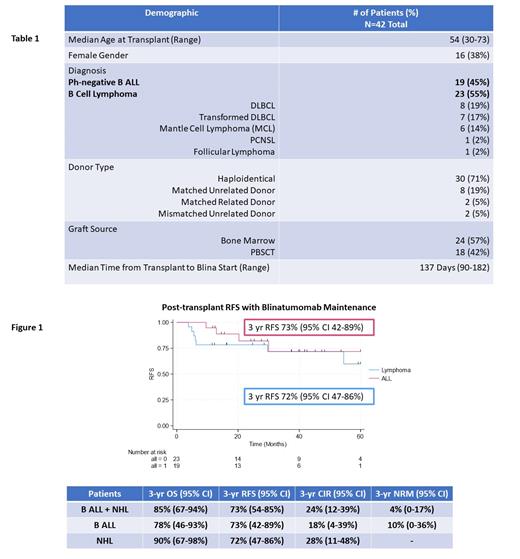Background: AlloBMT can be curative as consolidation for high risk B ALL and NHL. However, transplant-related toxicity and disease relapse limit survival. Post-transplantation cyclophosphamide (PTCy) as graft-versus-host disease (GVHD) prophylaxis limits GVHD and facilitates alternative allograft sources. Following PTCy, cellular immune reconstitution is favorable for strategies to augment anti-tumor immunity. Blinatumomab (blina) is effective in the treatment of CD19+ ALL and NHL. Blina leads to T cell activation that may enhance post-transplant tumor-specific T cell responses, leading to a more potent graft-versus-tumor effect. A study of 21 B ALL pts demonstrated the feasibility of post-transplant blina but did not improve survival when pts universally remained on immunosuppression for at least 1 cycle of treatment (Gaballa. Blood. 2022). We present results of a phase Ib/II trial to assess the tolerability and preliminary efficacy of blina as post-alloBMT remission maintenance in B-cell ALL and NHL in pts off immunosuppression.
Methods: Pts ≥1 month-old with high risk CD19+ B ALL or ≥18 years-old with NHL who underwent alloBMT with PTCy were eligible. Pts had to be 60-180 days post-transplant with count recovery and in remission. Pts had to be off immunosuppression for ≥4 weeks prior to treatment, and without a history of grade ≥3 acute GVHD or severe chronic GVHD. Pts could receive 2 cycles of blina if they had evidence of disease (including MRD) at their pre- and/or post-transplant evaluations but otherwise received 1 cycle. Blina was given as a continuous infusion at 9 mcg/day on C1D1-7 and 28 mcg/day on C1D8-28 and C2D1-28.
Results: The study closed to accrual on January 31, 2023 following enrollment of 42 pts (26 male/16 female) with a median age of 54 (Range 30-73). Among enrolled pts, 19 had Ph-negative B ALL and 23 had B-cell NHL. All pts underwent reduced-intensity conditioning alloBMT using a regimen of fludarabine, cyclophosphamide, and total body irradiation. Median prior lines of therapy were 2 (range 1-6). Additional transplant details are presented in Table 1. All B ALL pts were in an MRD-negative CR by flow cytometry at a sensitivity of 0.01% at alloBMT. All pts received a single cycle of therapy. Pts started blina a median of 137 days post-transplant (range, 90-182). Four pts failed to complete a full cycle due to G4 transaminitis (1), G4 neutropenia (1), relapse (1), and patient preference in the setting of tremors (1). Grade 3 or 4 adverse events felt to be at least possibly related to the study drug included G3 neutropenia (7%), G4 neutropenia (19%), anemia (5%), G3 ALT (5%), G4 AST (2%), G3 AST (2%), and neurotoxicity (7%). Two pts (5%) developed chronic GVHD following blina requiring the resumption of immunosuppression. At a median follow-up of 40 months post-alloBMT, the 3-year relapse-free survival is 73% (95% CI 54-85%) due to a 24% (95% CI 12-39%) incidence of relapse and a 4% (95% CI 0-17%) incidence of non-relapse mortality, as shown in Figure 2. All 3 (100%) relapsed B ALL pts and 2/6 (33%) relapsed B NHL pts presented with CNS involvement. Four pts with CNS relapse (80%) had CNS involvement prior to alloBMT. Among 2 pts who died without relapse, 1 was unrelated to alloBMT, while the other died of therapy-related myeloid neoplasm. Data on biomarkers including changes in T cell subpopulations in both BM and PB, and co-signaling molecule expression will be presented.
Conclusions: Post-alloBMT maintenance therapy with blina is feasible with minimal toxicity in pts off immunosuppression. Initial survival outcomes are promising with the majority of relapses involving the CNS. A randomized trial of maintenance with blina after alloBMT with PTCy is needed to confirm efficacy in this high-risk population.
OffLabel Disclosure:
Webster:Pfizer: Consultancy; Servier: Consultancy. Wagner-Johnston:Astex: Research Funding; Genentech: Research Funding; Beigene: Consultancy, Research Funding; ADC Therapeutics: Research Funding; Merck: Research Funding. Bonifant:NA: Other: Patents pending on use of engineered cellular therapies for cancer; Sharpe: Research Funding; Bristol Myers Squibb: Research Funding; Merck: Research Funding; Dohme, Inc.: Research Funding. Jain:CTI Biopharma, Kartos therapeutics, Incyte: Research Funding; Care Dx, Bristol Myers Squibb, Incyte, Abbvie, CTI, Kite, Cogent Biosciences, Blueprint Medicine, Telios pharma, Protagonist therapeutics: Membership on an entity's Board of Directors or advisory committees. Levis:Astellas Global Pharma: Research Funding; Abbvie: Consultancy; Amgen: Consultancy; Bristol Myers Squibb: Consultancy; Daiichi-Sankyo: Consultancy; Jazz: Consultancy; Menarini: Consultancy; Takeda: Consultancy; FujiFilm: Research Funding; Pfizer: Consultancy. Luznik:Gilead Sciences: Consultancy; Precision Biosciences: Consultancy; Rubius Therapeutics: Consultancy; Talaris Therapeutics: Consultancy; WindMiL therpeutics: Patents & Royalties; Genentech: Research Funding. Gojo:Merck: Research Funding; Amgen: Consultancy, Membership on an entity's Board of Directors or advisory committees, Research Funding; Gilead: Research Funding; Incyte: Research Funding; Nkarta: Consultancy, Membership on an entity's Board of Directors or advisory committees; Scimentum: Consultancy, Membership on an entity's Board of Directors or advisory committees; MJH Healthcare Holdings: Consultancy, Membership on an entity's Board of Directors or advisory committees; Clearview: Consultancy, Membership on an entity's Board of Directors or advisory committees.
Blinatumomab as post-alloBMT maintenance for patients in remission


This feature is available to Subscribers Only
Sign In or Create an Account Close Modal